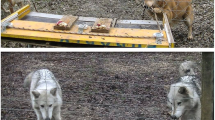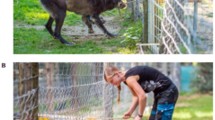Abstract
Cooperative hunting is a cognitively challenging activity since individuals have to coordinate movements with a partner and at the same time react to the prey. Domestic dogs evolved from wolves, who engage in cooperative hunting regularly, but it is not clear whether dogs have kept their cooperative hunting skills. We presented pairs of dogs with a reward behind a fence with two openings in it. A sliding door operated by the experimenter could block one opening but not both simultaneously. The dogs needed to coordinate their actions, so that each was in front of a different opening, if one of them was to cross through and get food. All 24 dog pairs solved the problem. In study 1, we demonstrated that dogs understood how the apparatus worked. In study 2, we found that, although the performance of the pairs did not depend on the divisibility of the reward, pairs were quicker at coordinating their actions when both anticipated rewards. However, the dogs did not monitor one another, suggesting that their solutions were achieved by each individual attempting to maximize for itself.



Similar content being viewed by others
References
Boesch C (1994) Cooperative hunting in wild chimpanzees. Anim Behav 48:653–667
Boesch C, Boesch H (1989) Hunting behavior of wild chimpanzees in the Taï National Park Ivory Coast. Am J Phys Anthropol 78:547–573
Boesch C, Boesch-Achermann H (2000) The chimpanzees of the Tai Forest. Univ Press, Oxford
Bradshaw JWS, Blackwell EJ, Casey RA (2009) Dominance in domestic dogs—useful construct or bad habit? J Vet Behav 4:135–144
Bräuer J, Hanus D (2012) Fairness in non-human primates? Soc Justice Res 25:256–276
Bräuer J, Call J, Tomasello M (2006) Are apes really inequity averse? Proc R Soc B 273:3123–3128
Bräuer J, Call J, Tomasello M (2009) Are apes inequity averse? New data on the token-exchange paradigm. Am J Primatol 71:175–181
Brosnan SF, de Waal FB (2003) Monkeys reject unequal pay. Nature 425:297–299
Brosnan SF, Schiff HC, Waal FBMd (2005) Tolerance for inequity may increase with social closeness in chimpanzees. Proc R Soc B 272:253–258
Bshary R, Grutter AS (2006) Image scoring and cooperation in a cleaner fish mutualism. Nature 441:975–978
Bullinger AF, Wyman E, Melis AP, Tomasello M (2011) Coordination of chimpanzees (Pan troglodytes) in a stag hunt game. Int J Primatol 32(6):1296–1310. doi:10.1007/s10764-011-9546-3
Coppinger R, Coppinger L (2001) Dogs: a startling new understanding of canine origin, behavior, and evolution. Scribner, New York
Creel S, Creel NM (2002) The African wild dog: behavior, ecology, and conservation. Princeton University Press, Princeton
de Waal FBM, Davis JM (2003) Capuchin cognitive ecology: cooperation based on projected returns. Neuropsychologia 41:221–228
Dindo M, de Waal FBM (2007) Partner effects on food consumption in brown capuchin monkeys. Am J Primatol 69:448–456
Drea CM, Carter AN (2009) Cooperative problem solving in a social carnivore. Anim Behav 78:967–977
Dubreuil D, Gentile MS, Visalberghi E (2006) Are capuchin monkeys (Cebus apella) inequity averse? Proc R Soc B 273:1223–1228
Fontenot MB, Watson SL, Roberts KA, Miller RW (2007) Effects of food preferences on token exchange and behavioural responses to inequality in tufted capuchin monkeys, Cebus apella. Anim Behav 74:487–496
Gacsi M, Gyori B, Miklosi A, Viranyi Z, Kubinyi E, Topal J, Csanyi V (2005) Species-specific differences and similarities in the behavior of hand-raised dog and wolf pups in social situations with humans. Dev Psychobiol 47:111–122
Gazda SK, Connor RC, Edgar RK, Cox F (2005) A division of labour with role specialization in group-hunting bottlenose dolphins (Tursiops truncatus) off Cedar Key, Florida. Proc R Soc B London 272:135–140
Geissmann T, Orgeldinger M (2000) The relationship between duet songs and pair bonds in siamangs, Hylobates syndactylus. Anim Behav 60:805–809
Gilby IC, Eberly LE, Wrangham RW (2008) Economic profitability of social predation among wild chimpanzees: individual variation promotes cooperation. Anim Behav 75:351–360
Haccou P, Meelis E (1994) Statistical analyses of behavioural data. University Press, Oxford
Hare BA, Melis AP, Woods V, Hastings S, Wrangham RW (2007) Tolerance allows bonobos to outperform chimpanzees on a cooperative task. Curr Biol 17:619–623
Heinsohn R, Packer C (1995) Complex cooperative strategies in group-territorial African lions. Science 269:1260–1262
Hirata S, Fuwa K (2007) Chimpanzees (Pan troglodytes) learn to act with other individuals in a cooperative task. Primates 48:13–21
Jensen K, Hare B, Call J, Tomasello M (2006) What’s in it for me? Self-regard precludes altruism and spite in chimpanzees. Proc R Soc B 273:1013–1021
Jensen K, Call J, Tomasello M (2007) Chimpanzees are rational maximizers in an ultimatum game. Science 318:107–109
Magrath RD, Pitcher BJ, Dalziell AH (2007) How to be fed but not eaten: nestling responses to parental food calls and the sound of a predator’s footsteps. Anim Behav 74:1117–1129
Mech L (1970) The Wolf: the ecology and behavior of an endangered species. University of Minnesota Press, Minneapolis
Mech LD, Boitani L (2003) Wolves: behavior, ecology, and conservation. University of Chicago Press, Chicago
Melis AP, Semmann D (2010) How is human cooperation different? Philos T R Soc B 365:2663–2674
Melis AP, Hare B, Tomasello M (2006a) Chimpanzees recruit the best collaborators. Science 311:1297–1300
Melis AP, Hare B, Tomasello M (2006b) Engineering cooperation in chimpanzees: tolerance constraints on cooperation. Anim Behav 72:275–286
Melis AP, Hare B, Tomasello M (2009) Chimpanzees coordinate in a negotiation game. Evol Hum Behav 30:381–392
Mersmann D, Tomasello M, Call J, Kaminski J, Taborsky M (2011) Simple mechanisms can explain social learning in domestic dogs (Canis familiaris). Ethology 117(8):675–690
Miklosi A (2007) Dog behaviour, evolution, and cognition. Oxford University Press, Oxford
Miklosi A, Kubinyi E, Gacsi M, Viranyi Z, Csanyi V (2003) A simple reason for a big difference: wolves do not look back at humans but dogs do. Curr Biol 13:763–766
Mills MGL (1990) Kalahari Hyaenas: comparative behavioral ecology of the two species. Unwin Hyman, London
Mitani JCC (2006) Demographic influences on the behavior of chimpanzees. Primates 47:6–13
Naderi S, Miklósi Á, Doka A, Csányi V (2001) Co-operative interactions between blind persons and their dogs. Appl Anim Behav Sci 74:59–80
Oldfield-Box H (1967) Social organization of rats in a “social problem” situation. Nature 213:533–534
Pongracz P, Miklosi A, Kubinyi E, Topal J, Csanyi V (2003) Interaction between individual experience and social learning in dogs. Anim Behav 65(3):595–603
Range F, Horn L, Viranyi Z, Huber L (2009) The absence of reward induces inequity aversion in dogs. Proc Natl Acad Sci USA 106:340–345
Roma PG, Silberberg A, Ruggiero AM, Suomi SJ (2006) Capuchin monkeys, inequity aversion, and the frustration effect. J Comp Psychol 120:67–73
Ruusila V, Pesonen M (2004) Interspecific cooperation in human (Homo sapiens) hunting: the benefits of a barking dog (Canis familiaris). Ann Zool Fennici 41:545–549
Seed AM, Clayton NS, Emery NJ (2008) Cooperative problem solving in rooks (Corvus frugilegus). Proc R Soc B 275:1421–1429
Serpell JE (1995) The domestic dog: its evolution, behaviour and interactions with people. Cambridge University Press, Cambridge
Stander PE (1992) Cooperative hunting in lions: the role of the individual. Behav Ecol Sociobiol 29:445–454
Takimoto A, Kuroshima H, Fujita K (2010) Capuchin monkeys (Cebus apella) are sensitive to others’ reward: an experimental analysis of food-choice for conspecifics. Anim Cogn 13:249–261
Tomasello M, Call J (1997) Primate cognition. Oxford University Press, New York
Tomasello M, Carpenter M, Call J, Behne T, Moll H (2005) Understanding and sharing intentions: the origins of cultural cognition. Behav Brain Sci 28:675–735
Topal J, Gacsi M, Miklosi A, Viranyi Z, Kubinyi E, Csanyi V (2005) Attachment to humans: a comparative study on hand-reared wolves and differently socialized dog puppies. Anim Behav 70:1367–1375
van Wolkenten M, Brosnan SF, de Waal FBM (2007) Inequity responses of monkeys modified by effort. Proc Natl Acad Sci USA 104:18854–18859
Warneken F, Tomasello M (2006) Altruistic helping in human infants and young chimpanzees. Science 311:1301–1303
Warneken F, Chen F, Tomasello M (2006) Cooperative activities in young children and chimpanzees. Child Dev 77:640–663
Acknowledgments
We thank the dogs’ owners for agreeing to participate in this study. We also want to thank Katrin Schumann for her help with the data collection and Julia Steinbrück und Jacqueline Rose for data scoring for inter-observer reliability purposes. We thank Roger Mundry for statistical advice.
Conflict of interest
We declare that the experiments comply with the current laws of Germany. We also declare that we have no conflict of interest.
Author information
Authors and Affiliations
Corresponding author
Rights and permissions
About this article
Cite this article
Bräuer, J., Bös, M., Call, J. et al. Domestic dogs (Canis familiaris) coordinate their actions in a problem-solving task. Anim Cogn 16, 273–285 (2013). https://doi.org/10.1007/s10071-012-0571-1
Received:
Revised:
Accepted:
Published:
Issue Date:
DOI: https://doi.org/10.1007/s10071-012-0571-1




